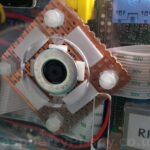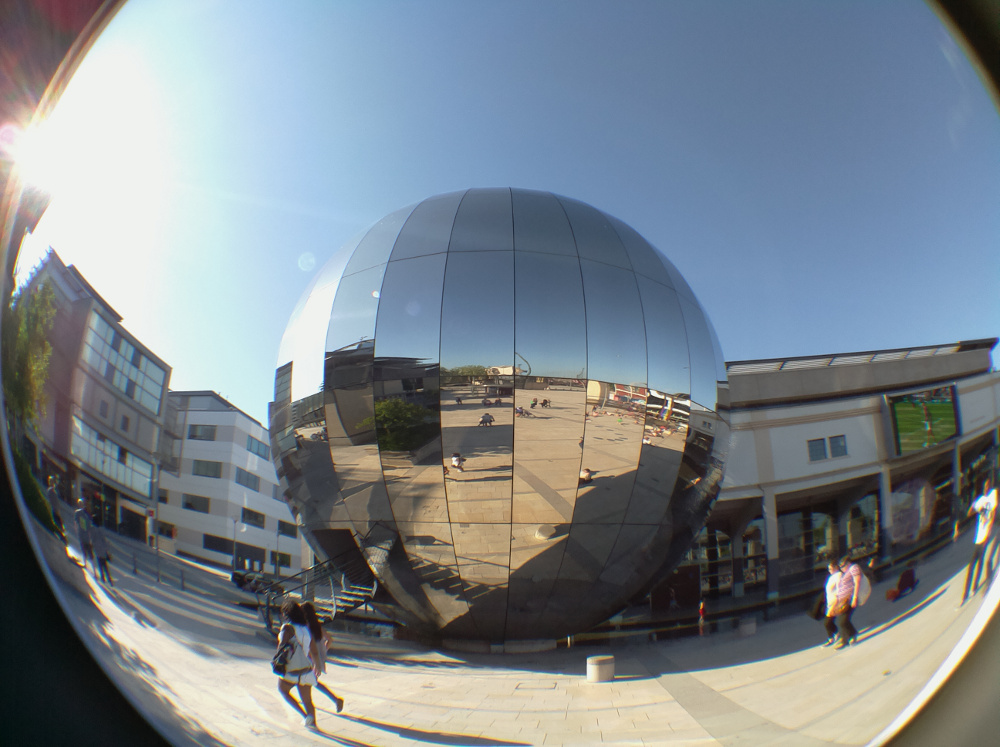I discovered on eBay that you could buy lenses designed to be attached to a mobile phone. They cost £6.99 and included a wide angle, fish eye and macro lens so I decided to take a gamble and order a set.
The lenses themselves are magnetic and attach to mobile phones with a metal ring around the camera. Some sticky metal rings are supplied to allow you to add a ring to your phone which the lenses can attach to.
So I stuck an 8mm washer to the front of my Raspberry Pi point-and-shoot camera and found the lenses were easy to attach. You have to align the centre of the lens with the centre of the Pi camera lens but that isn’t too hard. Here is what my camera looks like with the lenses attached :
When not in use the lenses can be covered with a lens cap and they have little metal plates which stick the the lens magnet on the other end. No they are not the best optical devices you are ever going to own but for £7 I think these are well worth the money.
Here’s an example fish eye lens. I’ve got no way of previewing or aligning the shot so it was just a case of pointing the camera, pressing the button and hoping for the best!
They give you a quick and cheap way to experiment with on-the-go photography without messing around with hundreds of pounds worth of fancy camera gear.
For example photos taken with this setup please visit again soon as I will be adding a post containing lots more images.







17 Comments
Hiya Matt.
Can you provide a link to the eBay lot?
—
Mike
Here is the eBay item : The item title is “Fish Eye Lens + Wide Angle Lens + Macro Lens 3-in-1 Kit for iPod iPhone 4G 4S” and the seller is “uk-sell”.
Cheers 🙂
You can purchase it in dx.com por 9,99$. Free world delivery.
http://dx.com/p/zea-f180r-3-in-1-fish-eye-0-67x-wide-angle-macro-lens-camera-kit-for-iphone-5-red-189785
Be aware that the review against this product on the DX website is wrong. The set looks the same as mine and there are 3 lenses. The wide angle lenses screws onto the macro lens. So you can attach a wide angle, macro or fish eye lens as required.
We use the same set on our wireless night vision PTZ wifi camera in the back garden for wildlife watching… They do a 4 lens kit which has a 2x zoom lens added to the mix as well.
Thanks for your interesting posts…I’ve actually been mirroring some of the ideas that you have come up with. Would be good to see if you’ve got any ideas around two issues I’m having (wondering if you’ve seen them):
1. When using the fish eye lens my camera is completely out of focus. I’ve tried everything…but can’t seem to figure it out. The wide angle and macro seem to work properly though.
2. running raspistill in -tl and -v mode, I’ll get to random figure of pictures and then the raspberry pi hangs. I’m mounting a SMB share to store the pictures. Unfortunately the only way to fix is to reboot and no logs exist.
One of the other things I’m trying to do (when I have some time) is to rig four/six pi’s to snap a picture a la ‘matrix’. Will keep you posted.
The focus issue may be due to the distance of the lens from the camera module lens. The positioning of mine was purely random but you may need to try adding some spacers (washers etc) to tweak the distance between the two lenses.
I’d be neat to see someone put this on a microscope.
Mike Cook has already done that with some great results! http://www.raspberrypi.org/archives/tag/microscopy
Hi Matt:
We are looking for a lens for the Raspberry PI that will zoom in on a small area from 50 feet. Is this possible with our Raspberry PI?
Thanks,
hi,
did you tried the zoom x2 with rasp camera ?
I would like to know what is the minimum distance to get a focused image…
thank you 🙂
Having a fussy eye, but a limited budget, I’m tempted with shelling out a couple more quid on a single lens like this:
http://shop.pimoroni.com/products/rpi-camera-wide-angle-lens
Hey Matt, I like the solution you came up for this and am trying to do something similar, can you give more details about the mounting rig it looks like you did?
I’m making some guesses, but it looks like you attached the camera to a test board, used some 3M strips to tape a washer large enough for the camera to look through to the test board, and then fastened the board to a case for the Pi (which I’m guessing you modified to support your rig). Is that about right?
The board is standard copper stripboard. It was easy to make the holes to mount the camera with nylon bolts. The white blocks are indeed sticky pads. The metal ring is just a stainless steel washer. I think it was 8mm if I remember correctly. The case was one of the cheap eBay cases with the flip lid. It already had the circular cut-out which helped. So all standard stuff. At the time they weren’t available but a shorter camera ribbon cable would be worth considering to reduce the number of times you have the bend the standard one to get it to fit in the case.
It’s worth considering a Protocam board as it serves the same purpose and may save you time in exchange for a modest cost : https://www.kickstarter.com/projects/955730101/protocam-the-raspberry-pi-camera-module-prototypin
Great information in this threat.
Has anybody tried such lenses on raspberry’s NOIR-cam? I wonder how much light gets absorbed and if the result is anywhere near night-vision-capability.
Thx in advance
+++